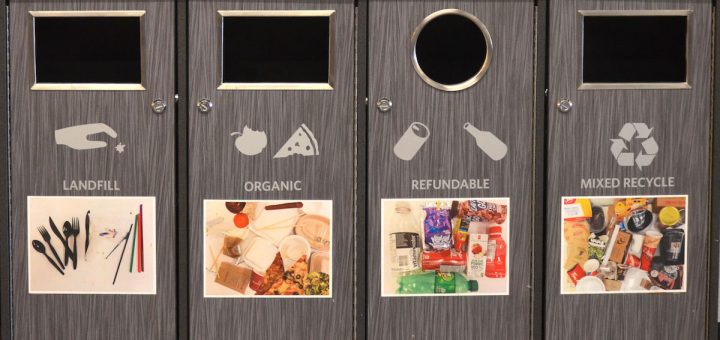How MRU is making trash “greener”

Environmental services implementing program to help sort waste on campus
By Anna Junker, Contributor
Mount Royal University is getting creative with environmental solutions for waste. In Sept. 2016, MRU rolled out an improved recycling and sustainability program. The aim is to reduce the university’s waste footprint.
In Jan. 2016, a waste audit found MRU was diverting 35 per cent of its waste away from the landfill.
“Hopefully we’re going to get to 75 per cent diversion rate by the end of 2017,” says Carol Hartwick, the information manager of Environmental Services.
According to information provided by Environmental Services, the university generated 376.59 tonnes of waste and recyclables in 2015. To put that into perspective, 376.59 tonnes is equal to 250 midsize cars.
The 90 new bins provide different ways to get rid of waste:
1. Mixed Recycle: all kinds of paper and paper products, cardboard, coffee cups with lids, food containers, metal, glass bottles, and recyclable plastic. A triangle indicates this.
2. Refundable: bottles, cans, milk and juice cartons and tetra packs. These can also be placed in mixed recycle, however, going through refundables allows MRU to get revenue back which goes towards more sustainability programs.
3. Paper/Cardboard: only white paper, cardboard and folded down poster board.
4. Landfill: non-recyclable plastics such as straws and plastic stir sticks, styrofoam, cellophane (candy, chocolate bar wrappers or chip bags) and chewing gum.
There is a fifth option: organics, which is currently available in areas where there are food services such as Wyckham, The Table, Tim Hortons and Jugo Juice. Organic recycling can also be found where there are events such as the Lincoln Park Room, Ross Glen Hall and the Knuckle. This reduces leftover food waste from being brought to the landfill.
“Mixed recycle takes almost everything. Almost all your waste should be diverted into mixed recycle… Those wooden stir sticks or your chopsticks from Edo, or any of that, that can go in organics, as can your napkins and your paper towels and your food waste of course,” says Hartwick.
The bins have images on the front of them to help people sort where their waste goes but Hartwick says Environmental Services is hoping to have the images at eye level soon in order to provide easier sorting. The different waste options are only available inside the university at this time.
Hartwick says, “We have to eventually become compliant outdoors as well. So that’s just being studied right now on how we’re going to implement that. Right now, we just have landfill and refundable outside.”
As Hartwick puts it, change is happening slowly but surely.
Hartwick also says that the library has specialty recycling where people can recycle their pens and old cell phones.
“A lot of cell phones have certain elements within them that are very rare on Earth, so we do send them back and the school actually gets money back into its sustainability program.”
Gerry Young, the manager of Environmental Services at MRU says, “There’s a huge enthusiasm throughout the university, really everybody wants to get on board with [the program].”
Not only are these new bins permanently located in the main traffic routes and hallways of MRU, but there are also mobile bins to be brought in for events.
“They’re on wheels and are clearly marked, the red is landfill, green is organic. So we bring them to your event and it makes it really quite easy,” says Hartwick.
Currently, there is a one-month pilot project where five office areas are involved in determining the best mode of sustainable waste disposal. Through a survey based on experiences with five different methods, Environmental Services will decide which is the best option to move forward with.
“The pilot project will go back out for one more month with whichever the best one was. And at the end of that, one more survey and then the powers that hold the money will decide how we will roll out to the greater university,” says Hartwick.
We can also expect to see another pilot project in the near future.
“We will be doing a bathroom/washroom pilot project to get paper towel into the organics in places where there aren’t hand dryers,” says Hartwick.
Paper towel is unique to other paper materials, which is why it needs to be placed into organics.
In order to get people more excited about sustainability on campus, there will be a sustainability fair on Main Street near East Gate through March 21-23. Young says they are hoping to have zero waste stations, an e-cycle, a book exchange, a clothing exchange, and a plant sale with possible terrariums.
Hartwick says the response to the program has been really positive. “People have been really [on board], they want to learn.”




